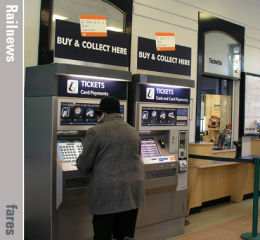Posted 1st March 2021 | No Comments
Protests as regulated fares rise by 2.6%

REGULATED fares on National Rail are rising by approximately 2.6 per cent in England today, but critics are condemning the rise.
The increase is lower in Scotland, where peak time journeys are rising by 1.6 per cent and others by 0.6 per cent.
The increases have come two months later than usual, and come alongside reports that all operators controlled by the Department for Transport in England have been instructed to introduce ‘flexible’ part time season tickets by June, to encourage commuters to return to rail.
The DfT, which has committed £10 billion to supporting the passenger railway since the pandemic began almost a year ago, says today’s rise is the lowest rise in four years, in spite of ‘unprecedented support for the rail industry’.
It added: ’By delaying the change in fares, passengers who needed to renew season tickets were able to get a better deal, and we will set our further plans to offer cheaper, more flexible tickets for commuters in due course.’
Labour’s shadow transport secretary Jim McMahon pointed out that fares have risen by an average of 43 per cent since 2010. He said: ‘This government is already hitting families in the pocket by forcing councils into economically illiterate tax rises when its failure means we are facing the worst recession of any major economy.
‘Now rail users will have to pay even more to use the services they rely on. This fare hike will make rail unaffordable for many and discourage people from getting back on to the network when lockdown restrictions ease in the coming months.’
Johnbosco Nwogbo, who is campaigner at the pressure group We Own It, said: ‘Yet another rail fare increase is a slap in the face for the public. After a year of job losses and economic hardship, why would we put up the cost of fares even further? We already have eye-wateringly high fares. This will see even more cash taken out of passengers pockets right at the point when we're seeing restrictions being eased and we'll start to see people returning to our railways in the coming months. Right now, it's key workers – the very people who are keeping the rest of us safe – who will face the brunt of this as they're the ones still taking the train to get to work.’
The Rail Delivery Group’s director of nations and regions Robert Nisbet said: ‘Ultimately, government decides how much it wants passengers to pay towards the cost of running the railway, but to give passengers better value, we want to work with government to recast how people buy their fares. Rather than needing a crystal ball to predict your plans to the last minute before buying a ticket, we want the whole country to benefit from a new, more flexible system where people pay-as-they-go and automatically get the best deal at the end of the week or month, similar to London. This would deliver a system which incentivises more people back to the network and helps drive a truly national economic recovery.’
